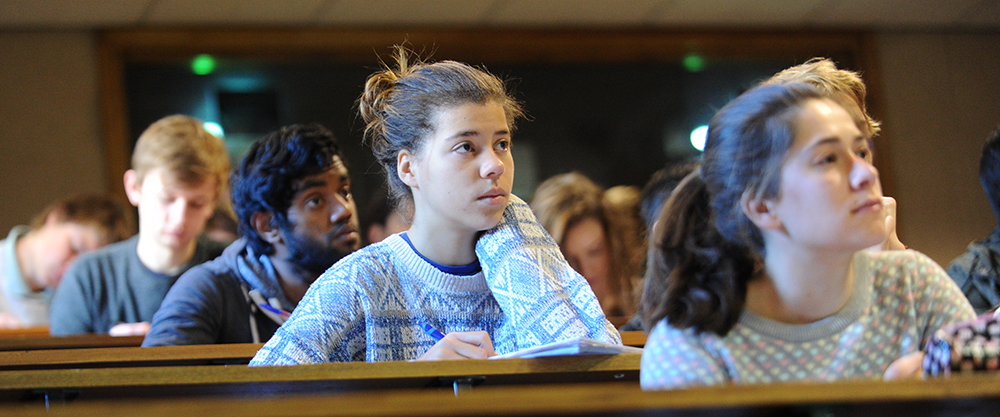Pharmacology at Cambridge
At the University of Cambridge, Pharmacology is studied in the second and third years as part of the Natural Sciences Tripos (NST) Part II course and Biological and Biomedical Sciences (BBS) Part II course.
The Pharmacology Department runs the Mechanisms of Drug Action course and participates in the Neurobiology with Human Behaviour Course. These are studied by all BBS students in the second-year.
Admission to undergraduate courses is by application to a College of the University. Besides the information to be found on this page, you can find information about how you can apply to Cambridge (including details about courses, Colleges and admissions interviews) here.
Course Overview
The Department runs a range of undergraduate courses. Information on these courses can be found on the following pages:
Recent Projects & Dissertations
The department offers a wide range of research projects, which you can see on the following page:
Pharmacology is an expanding science: fundamental research in pharmacology has already contributed to major advances in the development of drugs to treat or avert pain, heart attacks, diabetes, asthma, cancer, Parkinson's disease and many other disorders.
As we have come to understand more and more about how the body functions (a great deal of this understanding stems from an analysis of the actions of drugs) so new molecular targets have been uncovered for pharmacologists to aim at.
Basic, fundamental and innovative research in pharmacology is carried out in universities. Pharmaceutical companies in Britain are also vigorous and successful and have an excellent reputation for applied research and drug discovery.
Scientists well-qualified in pharmacology are required to maintain this strong research base on an international scale.
Students who have studied Pharmacology as Natural Scientists at Cambridge go on to a wide variety of careers.
These include basic or applied biological and clinical research in universities and other institutions, drug development in the pharmaceutical industry, as well as work in the financial sector, management and consultancy.
Pharmacology in Cambridge is studied in the second (Part IB) and third (Part II) years of the Natural Sciences Tripos (NST), following appropriate subjects in the first year (Part IA).
It is also studied by all Medical and Veterinary Students in their second year (Part IB) as 'Mechanisms of Drug Action' (MoDA). Medical and Veterinary students can also take Part II NST Pharmacology.
The Pharmacology course is particularly suitable for those Natural Sciences students who have taken Biology of Cells, Physiology of Organisms, or Chemistry in the first year of the Natural Sciences Tripos.
It is possible for students who have entered Cambridge to study physical science subjects to take the IB Pharmacology course. This is dependent on having completed the first-year Chemistry course.
Natural Sciences students take three courses in their second year, of which Pharmacology may be one.
The Part II (final year) course is taken alone. Detailed information on the Part II course is given here.
This course deals with the principles of drug action at the cellular, subcellular and molecular levels.
Emphasis is placed on the importance of the chemical structure of drug molecules and their interaction with receptors, ion channels, and the signal transduction process. Focus is also given to the molecular biology and molecular structure of the receptors themselves.
Topics studied include:
- The design of drugs and the way the body processes them
- The use of drugs in the chemotherapy of bacterial and viral infections and cancer
- The pharmacological actions of drugs on the major integrated systems of the body, including the cardiovascular system and the brain
The practical course is designed to give as wide an experience as possible of pharmacological methods and to illustrate experimentally the material covered in the lecture course.
Detailed information on the Part IB Natural Sciences course is given here.
Teaching
As well as being taught in the Department of Pharmacology, students are also taught in their Colleges. Most of the Members of the Department of Pharmacology's teaching staff, and some research staff are Fellows of Colleges.
Although some Colleges do not have Fellows from the Department of Pharmacology, they make arrangements with those Colleges that do have Fellows to organise College teaching in Pharmacology so that no student is put at a disadvantage through his or her choice of College.
The online lecture list provides information on all lectures that are held at the University, including the venue and time of each lecture.
As a matriculated student, you are entitled to attend any lectures (but not classes or practicals) of any degree course.
Students wishing to attend lectures for a subject for which they are not registered will be permitted to do so only if there is room for them in the lecture theatre.
Please check the details published by the Faculty or Department concerned before attending such lectures as you may be required to sign up in advance.
You can find all Pharmacology lectures and practicals timetables here.
We provide freely available student handbooks covering our main courses. These handbooks contain useful information such as course outlines, handouts, dissertation and examination information. It is highly encouraged that you read the relevant handbooks.
Detailed information on NST Part 1B, MODA and Part II courses can be found on the Moodle sites:
Students wishing to pursue research in the Department of Pharmacology leading to a postgraduate degree should see the Department's page on the current year's PhD programme.
There is also useful information in the University's Postgraduate page.
There are no taught postgraduate courses run by the Department.

